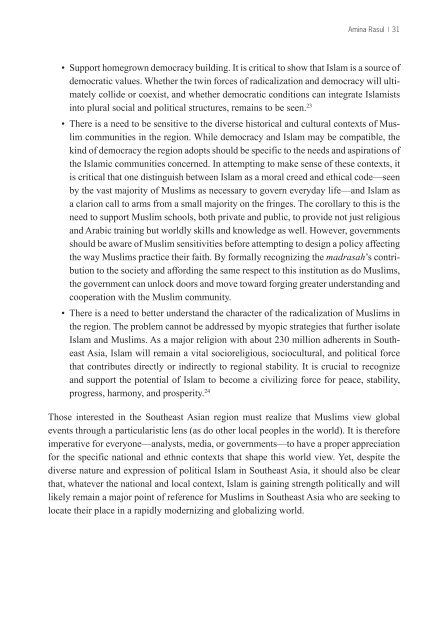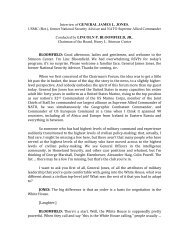Islam and Politics - The Stimson Center
Islam and Politics - The Stimson Center
Islam and Politics - The Stimson Center
You also want an ePaper? Increase the reach of your titles
YUMPU automatically turns print PDFs into web optimized ePapers that Google loves.
Amina Rasul | 31<br />
• Support homegrown democracy building. It is critical to show that <strong>Islam</strong> is a source of<br />
democratic values. Whether the twin forces of radicalization <strong>and</strong> democracy will ultimately<br />
collide or coexist, <strong>and</strong> whether democratic conditions can integrate <strong>Islam</strong>ists<br />
into plural social <strong>and</strong> political structures, remains to be seen. 23<br />
• <strong>The</strong>re is a need to be sensitive to the diverse historical <strong>and</strong> cultural contexts of Muslim<br />
communities in the region. While democracy <strong>and</strong> <strong>Islam</strong> may be compatible, the<br />
kind of democracy the region adopts should be specific to the needs <strong>and</strong> aspirations of<br />
the <strong>Islam</strong>ic communities concerned. In attempting to make sense of these contexts, it<br />
is critical that one distinguish between <strong>Islam</strong> as a moral creed <strong>and</strong> ethical code—seen<br />
by the vast majority of Muslims as necessary to govern everyday life—<strong>and</strong> <strong>Islam</strong> as<br />
a clarion call to arms from a small majority on the fringes. <strong>The</strong> corollary to this is the<br />
need to support Muslim schools, both private <strong>and</strong> public, to provide not just religious<br />
<strong>and</strong> Arabic training but worldly skills <strong>and</strong> knowledge as well. However, governments<br />
should be aware of Muslim sensitivities before attempting to design a policy affecting<br />
the way Muslims practice their faith. By formally recognizing the madrasah’s contribution<br />
to the society <strong>and</strong> affording the same respect to this institution as do Muslims,<br />
the government can unlock doors <strong>and</strong> move toward forging greater underst<strong>and</strong>ing <strong>and</strong><br />
cooperation with the Muslim community.<br />
• <strong>The</strong>re is a need to better underst<strong>and</strong> the character of the radicalization of Muslims in<br />
the region. <strong>The</strong> problem cannot be addressed by myopic strategies that further isolate<br />
<strong>Islam</strong> <strong>and</strong> Muslims. As a major religion with about 230 million adherents in Southeast<br />
Asia, <strong>Islam</strong> will remain a vital socioreligious, sociocultural, <strong>and</strong> political force<br />
that contributes directly or indirectly to regional stability. It is crucial to recognize<br />
<strong>and</strong> support the potential of <strong>Islam</strong> to become a civilizing force for peace, stability,<br />
progress, harmony, <strong>and</strong> prosperity. 24<br />
Those interested in the Southeast Asian region must realize that Muslims view global<br />
events through a particularistic lens (as do other local peoples in the world). It is therefore<br />
imperative for everyone—analysts, media, or governments—to have a proper appreciation<br />
for the specific national <strong>and</strong> ethnic contexts that shape this world view. Yet, despite the<br />
diverse nature <strong>and</strong> expression of political <strong>Islam</strong> in Southeast Asia, it should also be clear<br />
that, whatever the national <strong>and</strong> local context, <strong>Islam</strong> is gaining strength politically <strong>and</strong> will<br />
likely remain a major point of reference for Muslims in Southeast Asia who are seeking to<br />
locate their place in a rapidly modernizing <strong>and</strong> globalizing world.

















